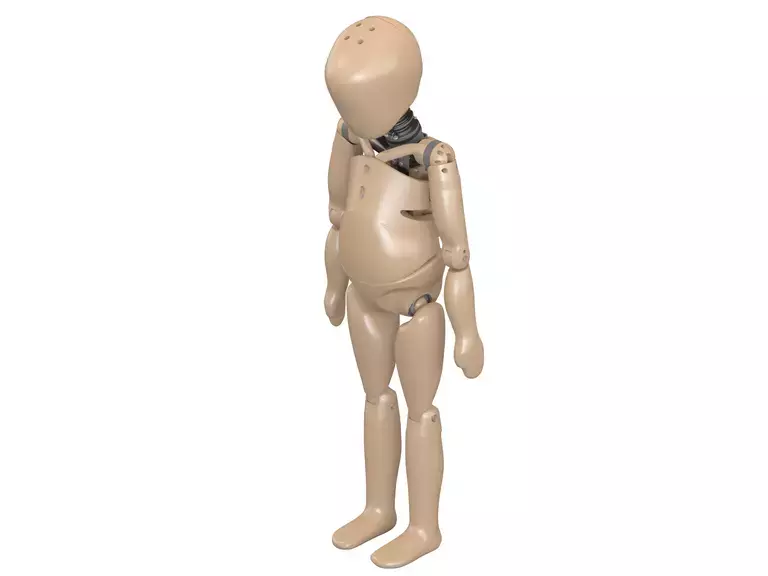
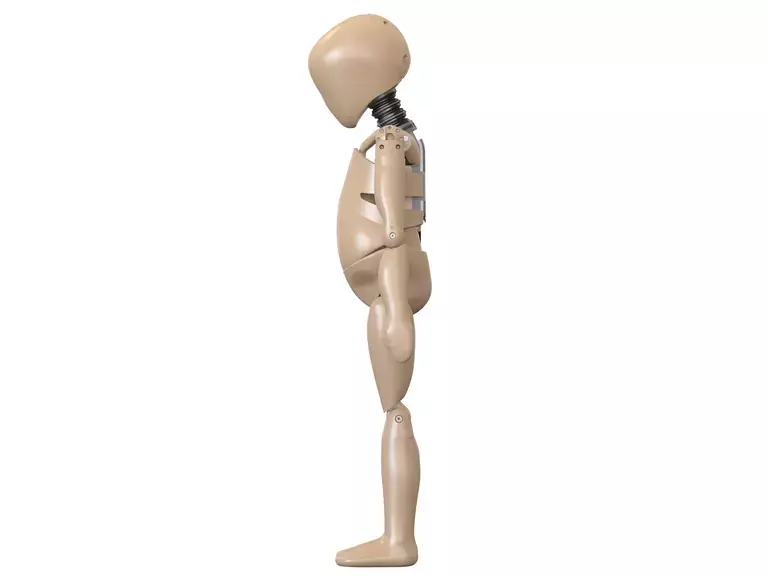
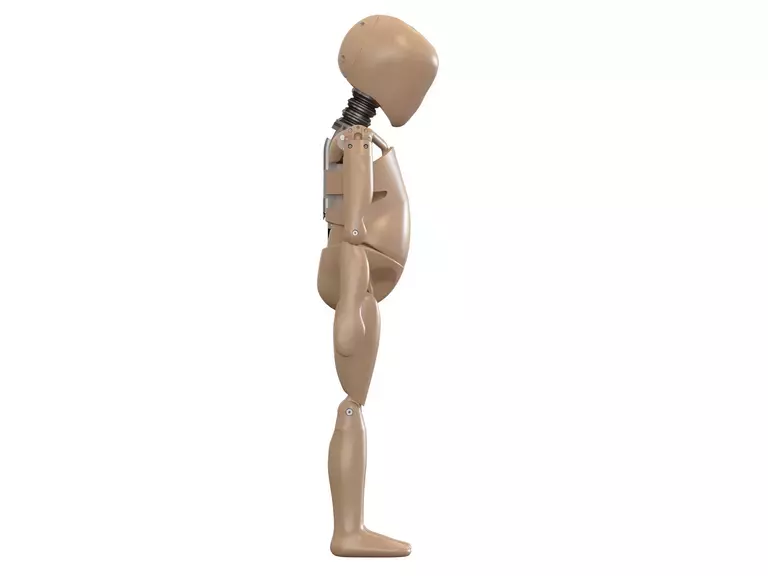
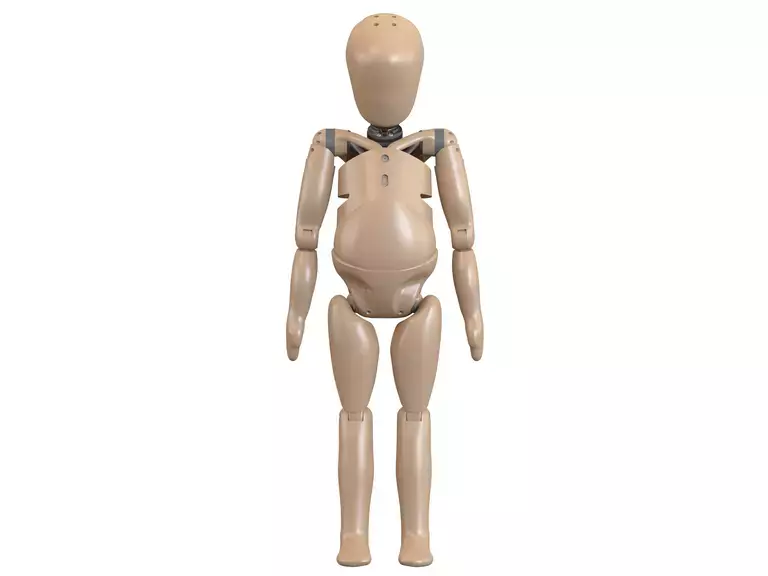
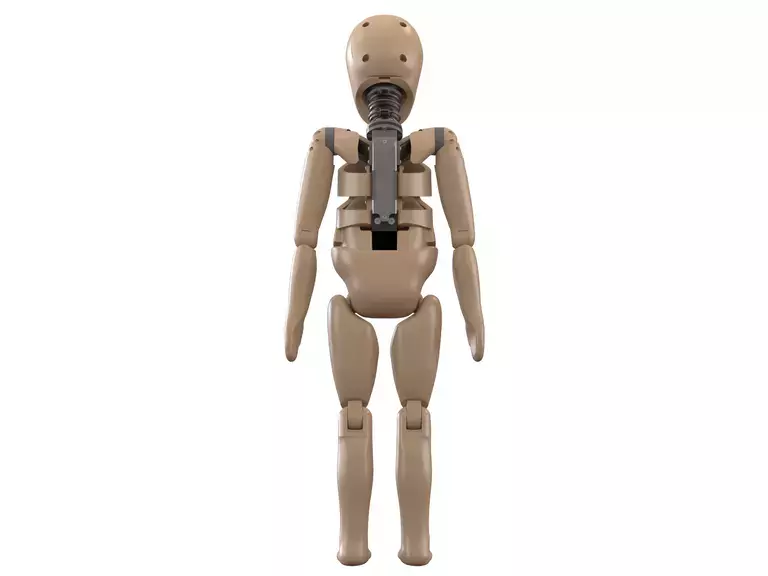
Q-Series Q3 Dummy
- Standard Q3 ATD 020-0001
In the early 1990s, statistics showed that there was much room for improvement in the design of child restraint systems (CRS) in vehicles. The existing P-Series of child dummies used for testing CRS had a simple design and were limited in their measurement capability.
Our Q-Series of child dummies were developed in 1993 as successors to the P-Series in the hopes of giving engineers the information they needed to design greater impact protection for children in cars. This new generation of dummies has much better anthropometry, biomechanics, and kinematics, all key to better evaluating the risk of injury to varying ages and sizes of child passengers. The Q-Series can be used in frontal or side impact testing, and the instrumentation is interchangeable within the dummy series.
The Q3 dummy is suitable for frontal as well as side impact CRS evaluations, to be used for both homologation, consumer rating, and research purposes.
Specifications
Key Features
- Rigid plastic skull with accelerometer cavity, soft durable head skin with biofidelic response.
- Neck consists of rubber segments between metal plates to allow realistic flexion, extension and lateral flexion rotational behavior.
- Shoulder incorporates a ball and socket joint to simulate the humerus-scapula joint with a scapula distributing load at the back.
- Frictional adjustment included for positioning the arms.
- Abdomen: APTS pressure sensors to measure belt pressure, particularly for submarining
- Sit-stand designs, anatomically shaped bony parts from anatomical data and child X-rays.
Product Specifications
| Sitting Height | 544 mm | 21.4 in |
| Stature | 985 mm | 38.8 in |
| Shoulder Height | 329 mm | 13 in |
| Shoulder Width | 259 mm | 10.2 in |
| Chest Depth | 114 mm | 4.5 in |
| Hip Width | 200 mm | 7.9 in |
| Buttock to Knee | 305 mm | 12 in |
| Buttock to popliteus, sitting | 253 mm | 10 in |
| Total Weight | 14.59 kg | 32.2 lb |
Applications
- Vehicular front and side impact testing.
Regulations
| WHERE USED | DEFINING REGULATION |
|---|---|
| ANCAP | E/ECE/324/Rev.2/Add.128 E/ECE/TRANS/505/Rev.2/Add. 128 Annex 8. UN R129 |
| ASEAN NCAP | E/ECE/324/Rev.2/Add.128 E/ECE/TRANS/505/Rev.2/Add. 128 Annex 8. UN R129 |
| C-NCAP | E/ECE/324/Rev.2/Add.128 E/ECE/TRANS/505/Rev.2/Add. 128 Annex 8. UN R129 |
| Euro NCAP | E/ECE/324/Rev.2/Add.128 E/ECE/TRANS/505/Rev.2/Add. 128 Annex 8. UN R129 |
| KNCAP | E/ECE/324/Rev.2/Add.128 E/ECE/TRANS/505/Rev.2/Add. 128 Annex 8. UN R129 |
| Latin NCAP | E/ECE/324/Rev.2/Add.128 E/ECE/TRANS/505/Rev.2/Add. 128 Annex 8. UN R129 |
| UN R129 | E/ECE/324/Rev.2/Add.128 E/ECE/TRANS/505/Rev.2/Add. 128 Annex 8. UN R129 |
Instrumentation
| Linear Accels Axyz | Angular Velocity | Load Cells | Displacement | Pressure |
|---|---|---|---|---|
| Head Axyz | Head ωxyz | Neck Upper Fxyz, Mxyz | Ribcage Dx, Dy | APTS 2 (abdomen) |
| Thorax Axyz | Neck Lower Fxyz, Mxyz | |||
| Pelvis Axyz | Lower Lumbar Fxyz, Mxyz | |||
| Rib Cage Axy |